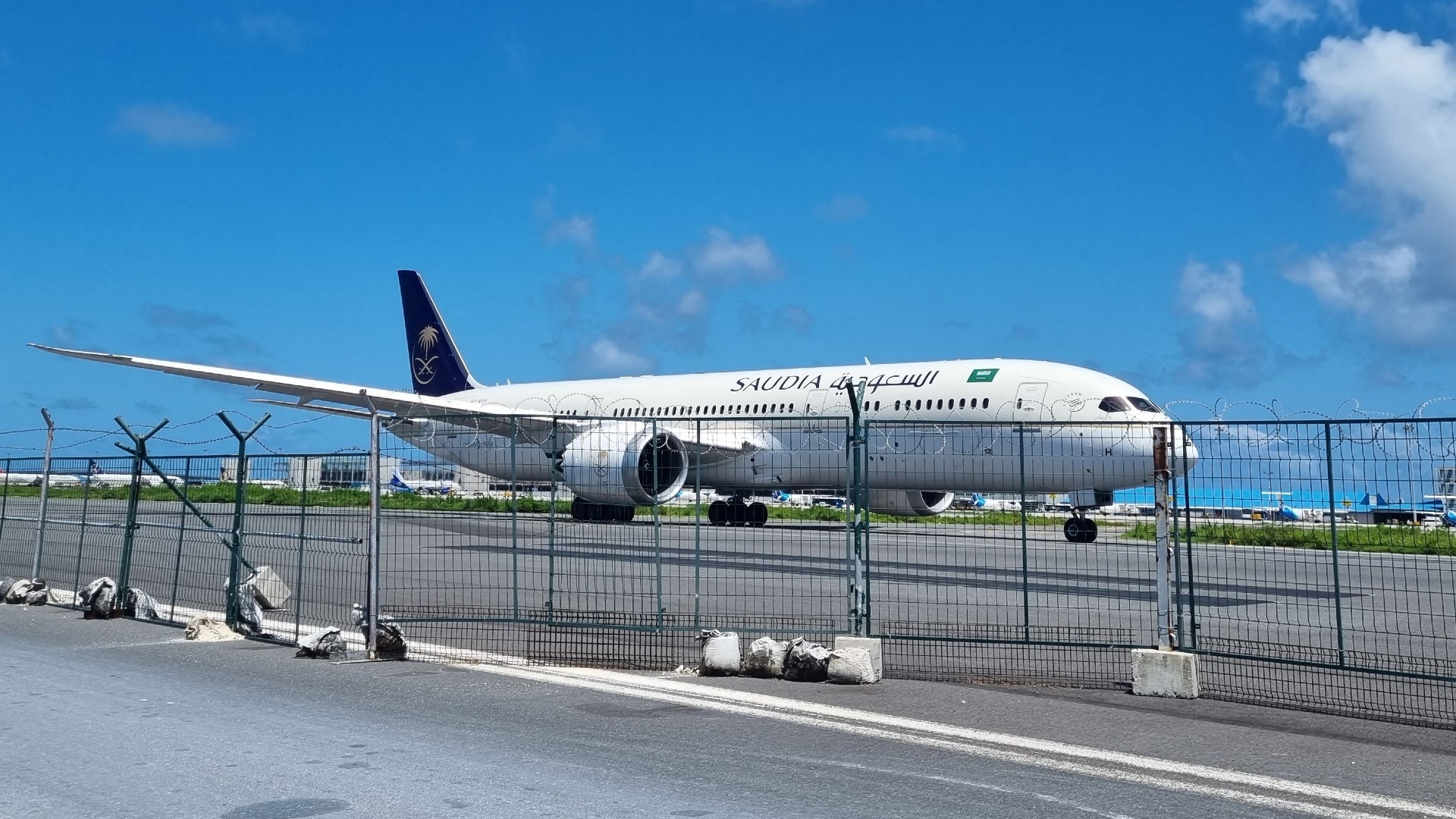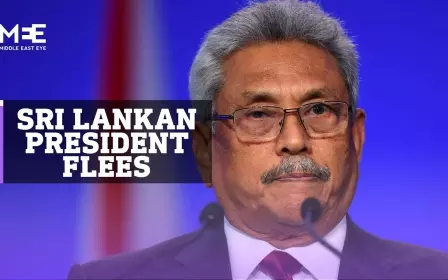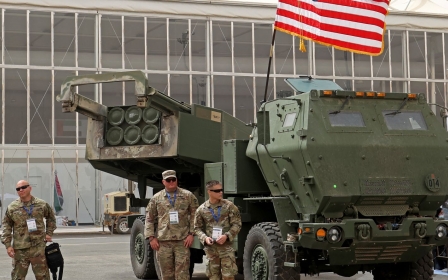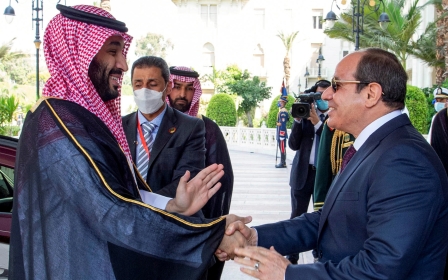From Idi Amin to Rajapaksa: Saudi Arabia is the choice for ousted leaders

Sri Lanka’s beleaguered President Gotabaya Rajapaksa may be on his way to Saudi Arabia, according to reports, which, if confirmed, would add him to an uncomfortable list of fallen leaders forced to seek asylum in the kingdom.
Rajapaksa fled to the Maldives, following remarkable scenes that saw protesters entering the presidential and prime ministerial estates, swimming in pools and taking selfies lounging on luxurious furniture.
The president confirmed his resignation after he and Prime Minister Ranil Wickremesing were widely blamed with economic mismanagement that has led to skyrocketing costs and shortages of essentials.
Rajapaska flew on a Saudi airlines flight to Singapore on Thursday, according to a report in the Associated Press.
The AP quoted a Maldives official as saying that he was heading to Jeddah, but the official later said he could no longer confirm it.
If his final destination is the Saudi coastal city, Rajapaksa would join an unenviable list of toppled rulers fleeing to the Gulf kingdom, either as a quiet retirement home or a pit stop on the path back to power.
From offering sanctuary to brutal Ugandan tyrant Idi Amin in the 1980s and a string of Pakistani leaders in the 2000s, to welcoming Tunisian and Yemeni rulers following the Arab Spring uprisings, Saudi Arabia has often been a home away from home for the overthrown, the disgraced and the embattled.
‘Apolitical’ retirement home
“This policy of hosting ousted and out-of-favour leaders from around the world reflects a traditional self-view that the Saudi leadership has of the country as a neutral, apolitical space,” Andrew Hammond, historian at Oxford University and author of a book on Saudi Arabia, told Middle East Eye.
“On the one hand that means there can be no political parties, protests, petitions and other modern phenomena related to representative electoral politics.
'As fellow authoritarians, the Saudis empathise with the threat of popular unrest and prioritise regime security over everything else'
- Andreas Krieg, assistant professor
“But on the other, it means the country can be open and welcoming to people of many stripes and origins, as long as they steer clear of politics or act within lines approved by the government.”
In most cases of asylum, leaders are given refuge at the Saudi government’s expense.
Ugandan strongman Amin, whose eight-year-rule in the 1970s was defined by widescale human rights abuses, extrajudicial killings and corruption, lived out the last two decades of his life peacefully in Jeddah.
He lived in a luxury villa overlooking the Red Sea paid for by the Saudi government, who also gave him a generous monthly stipend.
“I am leading a quiet life and committed to my religion, Islam, and Allah. I don’t have problems with anyone,” Amin told Uganda’s Sunday Vision in a rare 1999 interview.
“I am satisfied with what I am getting and even paying school fees for a number of my orphaned relatives in Uganda, and helping needy people."
Tunisian dictator Zin el Abidine Ben Ali chose the quiet life too, fleeing for Saudi Arabia in January 2011 following the revolution which began in his country and sparked the Arab Spring uprisings across the whole region.
Like Amin, little was known about Ben Ali’s life in Saudi Arabia - aside from a 2013 Instagram post showing the former dictator, who ruled Tunisia for 23 years, smiling in striped pyjamas.
“As fellow authoritarians, the Saudis empathise with the threat of popular unrest and prioritise regime security over everything else. Those on the receiving end of popular unrest have often found refuge in the kingdom,” Andreas Krieg, assistant professor at the Defence Studies Department of King's College London, told MEE.
“The Saudis see themselves as counterrevolutionaries who try to protect the authoritarian status quo.”
‘Location for sensitive talks’
Not every ousted-leader-turned-Saudi-resident disappears into obscurity; some use it as a pit stop before attempting to return to power.
Former Pakistani Prime Minister Nawaz Sharif was deposed in 1999 on charges of kidnapping, hijacking and corruption, and sent to exile in Saudi Arabia with 18 members of his family.
His successor Parvez Musharraf later wrote in his memoirs that if not for the intervention of then Saudi king Fahd, Sharif would have been executed. Riyadh later offered asylum to Musharraf himself, after he was charged with high treason.
Sharif returned from the kingdom in 2008, and spent five years as an opposition leader, before once again leading Pakistan in 2013.
'It’s useful for Western powers to know there’s a place where difficult people in countries they want to see pacified can be sent off to quiet retirement'
- Andrew Hammond, historian
The country’s current prime minister, Sharif's younger brother Shehbaz Sharif, also spent years in Saudi exile along with the rest of his family.
“Some other Gulf countries like Qatar and the UAE have started to play the same game in the past 20 years, hosting controversial political figures,” says Hammond.
“It fits with the broader strategy of transforming these countries into tourism and investment hubs as well as providing a location for sensitive political talks aimed at resolving conflicts.”
Hammond cited Qatar leading negotiations with the Taliban, whose leaders spent years in exile in the Gulf emirate before returning to power in Afghanistan last year.
“It’s part of soft-power branding and marketing, offering another service to the traditional world powers and giving them one more reason not to harass you about things like human rights,” Hammond added.
“It’s useful for the Western powers who think of themselves as managers of the world to know there’s a place where difficult people in countries they want to see pacified can be sent off to quiet retirement.”
Krieg noted that while ousted leaders turning up in Saudi Arabia may have lost power, they still have usefulness to Riyadh.
“Ousted leaders provide access to alternative networks of elites that the kingdom can use for influence post-revolution,” he says.
“This is as much about the value of authoritarian stability as it is about foreign policy influence.”
Saudi rectifying ‘miscalculations’
Former Yemeni President Abd Rabbuh Mansour Hadi, meanwhile, continued to attempt to run his government from self-exile in Saudi Arabia.
Soon after Houthi rebels seized the capital Sanaa in 2014, Hadi fled to Riyadh, which had led a coalition of countries to intervene in Yemen, leading to the worst humanitarian crisis in modern history.
Hadi ran his government in exile for several years until finally ceding power to a new leadership council in April.
According to officials, he was forced to resign by Saudi authorities who had placed him under house arrest.
It wouldn’t be the first time that Riyadh has allegedly detained a beleaguered leader. In November 2017, Saudi Arabia was accused of holding Lebanon’s Saad Hariri days after he resigned as prime minister in in a televised address made from Riyadh.
Hammond believes that hosting ousted leaders may be an attempt to improve Saudi Arabia’s standing on the international stage.
“For [Crown Prince] Mohammed bin Salman it’s certainly a better look than the miscalculations of recent years, like abducting Lebanon’s prime minister or murdering a dissident writer who was beloved in US elite circles,” he says, referring to the Saudi killing of journalist Jamal Khashoggi.
“It will reinforce his importance to the Biden administration, and on the eve of hosting Biden himself.”
Whether he returns home to Sri Lanka for another stint at office or retires into obscurity, Rajapaksa is walking in the footsteps of fallen former giants.
Middle East Eye propose une couverture et une analyse indépendantes et incomparables du Moyen-Orient, de l’Afrique du Nord et d’autres régions du monde. Pour en savoir plus sur la reprise de ce contenu et les frais qui s’appliquent, veuillez remplir ce formulaire [en anglais]. Pour en savoir plus sur MEE, cliquez ici [en anglais].





